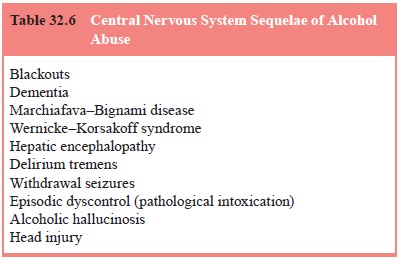Chapter: Essentials of Psychiatry: Delirium and Dementia
Alcohol-induced Dementia
Alcohol-induced Dementia
Epidemiology
Severe alcohol dependence is the third leading
cause of dementia. Alcohol-induced dementia is a relatively late occurrence,
gener-ally following 15 to 20 years of heavy drinking. Dementia is more common
in individuals with alcoholism who are malnourished. The CT scan shows cortical
atrophy and ventricular dilatation after about 10 years with neuronal loss, pigmentary
degeneration and glial proliferation. The frontal lobes are the most affected,
followed by parietal and temporal areas. The amount of deterio-ration is
related to age, number of episodes of heavy drinking and total amount of
alcohol consumed over time.
Clinical Features
Alcohol-induced dementia, secondary to the toxic
effects of alco-hol, develops insidiously and often presents initially with
changes in personality. Increasing memory loss, worsening cognitive processing
and concrete thinking follow. The dementia may be af-fected by periodic
superimposed delirious states including those caused by recurrent use of
alcohol and cross-sensitive drugs, respiratory disease related to smoking,
central nervous system

hemorrhage secondary to trauma, chronic hypoxia related to re-current seizure activity, folic acid deficiency and higher rates of some neoplasms among those with alcoholism (Table 32.6).
Treatment
The presence of dementia makes the treatment of
alcoholism more difficult. Most treatment programs depend on educa-tion about
substance abuse, working the 12 steps, some degree of sociability, and such
relatively abstract concepts as second-ary gratification and a higher power.
Such treatment programs are often reluctant to engage in the painstaking
repetition that patients with alcohol-induced dementia often require. These
patients may become frustrated in peer support groups such as Alcoholics
Anonymous. Despite these obstacles, patients with alcoholism who complete a treatment
program and remain sober do have some improvement in their mental state. There
is an ini-tial improvement that peaks at 3 to 4 weeks, followed by a slow but
steady improvement detected at 6 to 8 months. In general, the presence of a
cognitive deficit (dementia) dictates an alcohol treatment program that is
behavior based, concrete, structured, supportive and repetitive.
Related Topics